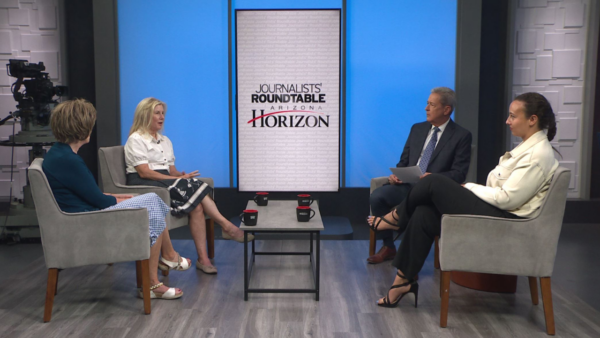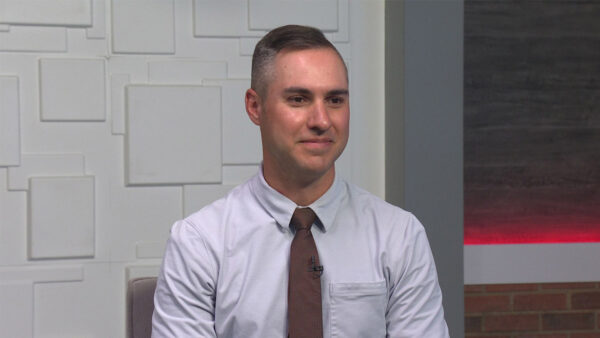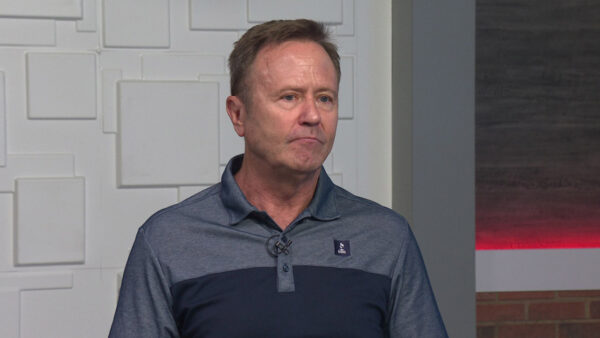It looks like the Arizona Coyotes and the Arizona Cardinals will make no effort to bid for the contract to manage the hockey arena for the Coyotes. Paul Giblin, has been covering the story for the Arizona Republic and will tell us more.
TED SIMONS: Coming up next on "Arizona Horizon," an update on Glendale's efforts to find a new management group for the Coyotes hockey arena and we'll hear about local research to bring down the price of algae-based fuel. That's next on "Arizona Horizon."
VIDEO: "Arizona Horizon" is made possible by contributions from the Friends of Eight, members of your Arizona PBS station. Thank you.
TED SIMONS: Good evening and welcome to "Arizona Horizon," I'm Ted Simons. Governor Ducey's Classrooms First Initiative Council wants more time to overhaul Arizona's education funding formula. The panel was supposed to present final recommendations yesterday, but instead asked for another six to nine months to allow the governor and other state leaders to focus on a school-funding ballot proposal scheduled for next May. Governor Ducey says he's okay with giving the panel the additional time. The deadline for bids to manage Glendale's hockey arena is approaching and it looks like neither the Arizona Cardinals nor the current management group with the Arizona Coyotes are all that interested in submitting bids. Here with more is Paul Giblin, who's been covering the story for The Arizona Republic. Good to see you again.
PAUL GIBLIN: Thank you.
TED SIMONS: Thanks for being here. Coyotes and Cardinals say thanks but no thanks, huh?
PAUL GIBLIN: That's right. Neither team is really happy with the city right now and they took a pass. The Cardinals have a number of issues with the city, mostly last time the city offered this management proposal, the Cardinals bid on it along with three other companies and the city didn't even look at those bids and instead they gave the management deal to the Coyotes. They didn't even tell the Cardinals they were rejected until after I twice asked the city t for the rejection letter. They thought that was a slight and they weren't having any of it this year.
TED SIMONS: So they basically said once bitten, twice shy?
PAUL GIBLIN: Right and the Cardinals have other issues with the city. The parking is always an issue for them. The Cardinals wanted to put a bubble near the stadium for summer training and that idea didn't go anywhere. So there's some friction there between the franchise and the city.
TED SIMONS: And there is obvious friction between the Coyotes and the city involving the deal. The deal, you mentioned the Cardinal deal they were shut out of and ignored on. That was 2013. That wound up going to the Coyotes and then I mean just not too long thereafter, the city rescinds the deal. Take us through all that.
PAUL GIBLIN: The interesting thing with that is the Coyotes never bid on that one. Like I said, the Cardinals and three other entities bid on it and the city gave the Coyotes a $15 million a year deal and there was some money going back to the city and there was a change in the city council and the new city council didn't like that proposal so much, and then they canceled it. There was a lot of other backroom stuff going on. The former city attorney for Glendale and the assistant city manager for Glendale left their city posts and took positions with the Coyotes and the city called foul on that and they ripped up the contract.
TED SIMONS: Ripped up the contract but then managed to cobble together kind of a two-year deal in which the Coyotes would continue to manage the arena under different terms but then again, the city turns right around and wants RFPs before the ink is dry. What was that all about?
PAUL GIBLIN: That was a surprise. I was talking to the president of the Coyotes, Anthony LeBlanc and he thought as soon as they put together the two-year deal, they would start negotiations. And I talked to some city councilmen and they told LeBlanc that it was a two-year deal and they would put the management thing out for request for proposal. There was not a clean understanding between those two sides.
TED SIMONS: No kidding.
PAUL GIBLIN: No kidding.
TED SIMONS: And now, he's saying I've got a business to do here, I can't believe fooling around here.
PAUL GIBLIN: It seems like he's reached the end of his rope. So he says he's looking around, they want to find another venue to play in and somewhere in the valley.
TED SIMONS: I want to get to that in a second. As far as the management out there at the Coyotes arena, the bid deadline is coming up next week, isn't it?
PAUL GIBLIN: Right, right. And it seems like the city is prepared to let the Coyotes go. They don't seem to be doing a lot to keep them. If they go, they seem to be okay with that.
TED SIMONS: Are there other bidders? Is anyone else interested? You're talking about concerts and events and if the Coyotes were to leave, lots of concerts and lots of events would be needed.
PAUL GIBLIN: Yes, and that's been another issue. There's I think 14 concerts this year if that number is correct. And so there hasn't been as many as they would want and so now if you lose the Coyotes hockey dates, theoretically that opens up the calendar for more concerts and other events but that's been kind of slow.
TED SIMONS: So do we know if there are any other bidders? Anyone else interested?
PAUL GIBLIN: No one has submitted a bid yet. Usually, those will come in on the last day. I talked to some city people and some groups have toured the facility they want to see what it's all about. Their expectation is that people will bid on it but nothing yet.
TED SIMONS: All right, you mentioned the fact that the Coyotes aren't even sure they're going to be playing there. What's that all about in terms of a multipurpose arena with the suns in Phoenix, elsewhere? What's going on with all of this?
PAUL GIBLIN: That's one option that Anthony LeBlanc, president of the Coyotes is talking about and also, the mayor of Phoenix. They're discussing the proposal, the idea of a new arena where the suns and the Coyotes would play somewhere in downtown Phoenix but right now, that's just at the beginning stages. The city officials say they're doing some due diligence. They want to see how much it's going to cost, what the possible funding sources would be, how much the teams would be willing to put into it, where it would be built, whether the public would be interested in financing it, whether the two teams can come to an agreement between themselves, there's a lot to discuss.
TED SIMONS: I was going to say if it's a public-private deal, how much public, how much private?
PAUL GIBLIN: I was looking at Milwaukee recently, that's a $500 million built and about half of that was privately funded and about half of it publicly funded. And whether that's a model for here, I don't know. That's what's out there right now.
TED SIMONS: Would this be a countywide deal kind of like the baseball stadium? Citywide?
PAUL GIBLIN: That's one of those questions that nobody has answered. It could be countywide, it could be citywide. We know in these are the big ticket things, usually the bigger the pot the better it is. So I would guess that they would probably want to do it countywide initiative of some kind but that makes it harder to sell as well for the public. Usually, you would think there would be a campaign for that and remember the Cardinals campaign, how much of those came and went without success before they got something that got some traction?
TED SIMONS: And folks actually got shot as far as the baseball stadium was concerned.
PAUL GIBLIN: That's true. There was a county commissioner who took a bullet in the rear end.
TED SIMONS: So basically, I've often wondered, there's so much, you know, fussing and fighting. Tribal lands. Isn't that -- has it even been mentioned?
PAUL GIBLIN: It has been mentioned. That's one of the other possibilities that the Coyotes talk about, perhaps a tribe. They say that's even more preliminary than some of the other discussions. And that would have some positives and negatives. One, the tribes can do whatever they want really. They don't need public buy-in. They can do whatever they want. The downside to that is they're really big ticket. Even if you have a lot of casino funding available, that's a big ticket for a small group like that.
TED SIMONS: Yeah, but I guess the idea would be that once you get it on your land, you've got big tickets coming in all the time.
PAUL GIBLIN: That would be the argument.
TED SIMONS: Yeah. So it's not out of the picture then?
PAUL GIBLIN: No, it's not out of the picture but I don't believe that one is as far along as the proposal with the city and the city proposal isn't that far along, either.
TED SIMONS: Let's get back to Glendale here. In general describe -- describe the leaders, mayor, council, their relationship with the pro teams and how that may contrast with the residents out there and how they feel about all of this.
PAUL GIBLIN: The interesting thing about the Coyotes and the Coyotes in particular, both teams, the Cardinals as well, is their fan base is huge. It's not just Glendale. So when the fans start talking, it's always useful to say where do you live? And often because they have big fan bases, it's not Glendale residents. Glendale residents I think are a little bit different. They look at some of their city services, the roads are in terrible condition, parks are closing, pool hours are shorter, fire department says they need more funding, that sort of thing. So that's the contrast there. The city council members are looking at the bigger picture and the sports fans are looking at the sports fans so there's some conflict there too.
TED SIMONS: The average Glendale resident, do they want to keep the Coyotes? Do they want to keep the Cardinals? How do they feel about this sports heavy push that is now kind of pushing the other direction?
PAUL GIBLIN: It is the identity of the city, Ted. You have the Super Bowl was there last year, the big college national championship game coming up. It is the identity of the city and Glendale people are proud of that and rightfully so. It's getting to the point where there's push and pull about other needs for the city. And the new council, the one that's on board now is less apt to push a lot of money towards the teams, they want the teams to sustain themselves and they're more willing to push money elsewhere.
TED SIMONS: So as far as the city is concerned, do you think just judging from what you've heard, do you think they really want that team to stay?
PAUL GIBLIN: Do I think the city wants the Coyotes to stay? They would like the Coyotes to stay on their terms which would be not giving them $15 million a year, with the idea that the team would pay the city rent to play at the arena. So I think they would like them to stay. Whether that's the same terms that the team would want, that's completely different. The team doesn't like those terms.
TED SIMONS: Last question, on a scale of 1 to 10, 1 meaning they are gone, they have no chance of staying, 10 meaning you might as well just get used to the Coyotes being in Glendale for the foreseeable future.
PAUL GIBLIN: I've given up. That's long ago. I'm always surprised. I couldn't tell you. I'm just the reporter reporting what's going on. I'm not going to make any projections.
TED SIMONS: How about a 6?
PAUL GIBLIN: I'll give you a 5.
TED SIMONS: Paul good to see you.
PAUL GIBLIN: Good to see you thank you.
VIDEO: Nearly 5 million people a year travel to Arizona from all over the world for a chance to peer into the sublime expanse of the grand canyon. It's hard to imagine that any of them notice the giant Navajo sandstone slab jutting from the earth just outside the park's eastern entrance at milepost 268 on highway 64. A plaque was once affixed to this stone. It honored the victims of one of the gravest air tragedies in American history. On the morning of June 30th, 1956, T.W.A. flight 2 and united airlines flight 718 left Los Angeles within minutes of each other. One was en route to Kansas city, the other for Chicago. They would collide over the Grand Canyon. Both airlines and the government would recover, identify and return home as many of the victims as the rugged wilderness would yield, 63 are buried in Flagstaff. Services were performed by Roman Catholic, Protestant, Jewish and Mormon clergymen. 29 unidentified victims from the united flight were interred below a memorial in the Grand Canyon cemetery on the south rim. Public outcry from the accident resulted in the creation of the federal aviation agency, and a modernization of the country's air traffic control system. Nobody knows what happened to the plaque that once paid tribute to the victims of flight 2 and 718 but their deaths are honored by the safe arrival of the many tourists that fly to the Grand Canyon each and every day.
Paul Giblin: Reporter Arizona Republic























